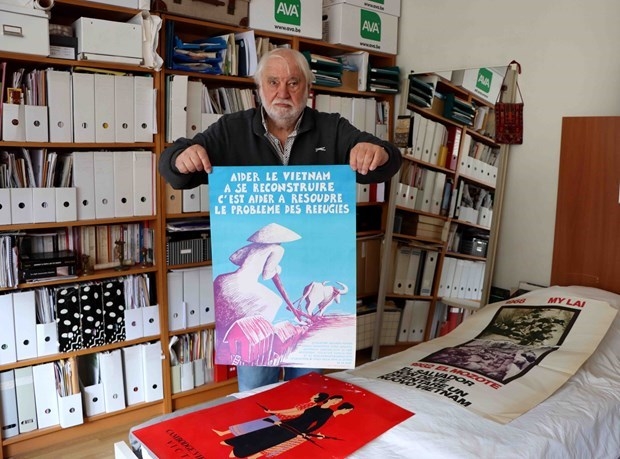 |
| Ralph Coeckelberghs and a propaganda poster in support of Vietnam. (Photo: VNA) |
In his home office in the suburbs of Brussels, the small souvenirs that Coeckelberghs brought back from his working trips abroad are elegantly displayed on bookshelves. Among them is a military hat with a five-pointed yellow star, a souvenir from his recent Vietnam visit in early March. There is also a clay buffalo and a lion statue made from a piece of coal he purchased in the northern Vietnam province of Quang Ninh over four decades ago. On the wall, he hangs propaganda posters against the Vietnam war.
Fifty-five years ago, the 24-year-old student at the Free University of Brussels (ULB) was close with a group of Vietnamese patriotic students. Realising that the war in Vietnam was a preposterous one, he joined in the first anti-Vietnam War protest in Belgium in 1964 when the US army bombed the northern city of Hai Phong. In particular, the Tet Offensive of 1968 was a hot topic of public concern in the international press at that time, which prompted Coeckelberghs and his group of friends to do something to protest the war.
Flipping through an album holding the newspaper articles from September 1968, which include pictures of a group of young men clashing with the police while protesting, Coeckelberghs felt both touched and proud. He recounted how he and his friends had protested outside a movie theater in Brussels to object to the screening of "The Green Berets", a movie about an elite US military unit fighting in southern Vietnam. Carrying banners against the US army and flags of the National Liberation Front of South Vietnam, the group led by Coeckelberghs was suppressed and arrested by the police. The event caused a sensation back then and was reported by famous French newspapers such as Le Monde and Paris Match.
During 1971-1973, Coeckelberghs was the President of the ULB’s Progressive Students' Association. The patriotism of his Vietnamese friends had deeply influenced him. In 1972, he engaged in a hunger strike with a group of Vietnamese students to protest the war in Vietnam. After graduation, he actively worked for many associations advocating for the abolition of racial discrimination and continued to stand with patriotic Vietnamese students.
Recalling the moment on April 30, 1975 when the US war in Vietnam ended and the country was completely liberated, Coeckelberghs said his emotions remain as fresh as if the event had just happened yesterday. He received the news from a friend who was a correspondent for RTBF radio and television in southern Vietnam. He was overjoyed and hurried to share the happiness with his Vietnamese friends. They hugged each other, danced and shouted with joy: "The war is over! Vietnam is liberated!".
Later on, Coeckelberghs worked for some international humanitarian organisations such as the International Federation of Red Cross and Red Crescent Societies and continued to maintain relationships with Vietnam. His first visit to the Southeast Asian country was in 1981, a difficult time for the nation. 42 years later, he had the opportunity to return to Vietnam and was amazed at how a small country once devastated by war had developed so rapidly. Highways stretched from the north to the south, new bridges spanned the Red River instead of only the Long Bien Bridge in the 1980s, and areas destroyed by war are now rebuilt in a modern way.
He affirmed that he has truly learned a lot from Vietnam's past, a resilient nation during the war which has become dynamic since gaining independence. It makes him optimistic about the development of the country, he said./.